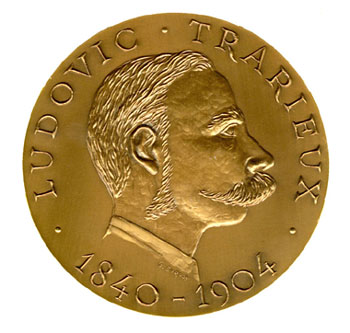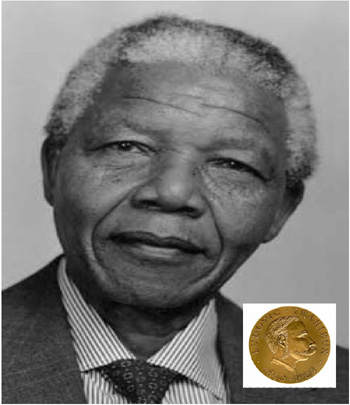

Nelson Mandela
|
|

|
Madima Rolihlahla Nelson Mandela was born at Mvezo, near Qunu, a tiny village on the banks of the Mbashe River in the district of Umtata, between Durban and East London, on July 18, 1918. His father, Henry Mgadla Mandela, was chief councillor to Thembuland's acting paramount chief David Dalindyebo. At age seven he started going to school under a British system where he was given the name "Nelson" probably referring to the British sea captain Lord Nelson. After his father's death, in 1930, the young Rolihlahla became the Paramount Chief's ward to be groomed to assume high office. However, influenced by the cases that came before the Chief s court, he determined to become a lawyer. It is told that earing the elders stories of his ancestors valour during the wars of resistance in defence of their fatherland, he decided also of making his own contribution to the freedom struggle of his people. |
Mandela matriculated at Healdtown Methodist Boarding School and then started a BA degree at Fort Hare University College where he was elected onto the Student's Representative Council. As an SRC member he participated in a student strike and was expelled, along with his lifelong friend, Oliver Tambo, in 1940.
Nelson Mandela was elected national volunteer-in-chief of the 1952 Defiance Campaign. He travelled the country organising resistance to discriminatory legislation. He was given a suspended sentence for his part in the campaign. Shortly afterwards a banning order confined him to Johannesburg for six months. During this period he formulated the "M Plan", in terms of which ANC branches were broken down into underground cells.
In 1952, Mandela and Tambo had opened the first black legal firm in the country, and Mandela was both Transvaal president of the ANC and deputy national president. A petition by the Transvaal Law Society to strike Mandela off the roll of attorneys was refused by the Supreme Court.
In the 'fifties, after being forced through constant bannings to resign officially from the ANC, Mandela analysed the Bantustan policy as a political swindle. He predicted mass removals, political persecutions and police terror. In December 1952 Mandela and a 19 others were arrested and charged under the Suppression of Communism Act for their participation in the Defiance Campaign. They were sentenced to nine months imprisonment with hard labour, suspended for two years. He was later served with a banning order prohibiting him from attending meetings for six months, or from leaving the Johannesburg magisterial district. For the following nine years his banning orders were continually renewed.
In December 1956 Mandela was one of the 156 political activists arrested and charged with high treason for the campaign leading to the adoption of the Freedom Charter in 1955. The trial lasted four and a half years, during which time charges against many of the accused were dropped, and it ended on 25 March 1961, when Mandela and 29 others were found not guilty. As well as being accused, Mandela played a legal role in the trial after the original defence lawyers withdrew during the 1960 state of emergency.
After the ANC was banned following the Sharpeville massacre in 1960, Nelson Mandela argued for the setting up of a military wing within the ANC. In June 1961, the ANC executive considered his proposal on the use of violent tactics and agreed that those members who wished to involve themselves in Mandela's campaign would not be stopped from doing so by the ANC. This led to the formation of Umkhonto we Sizwe (MK), the military wing of the ANC, the same year. In 1962 Mandela left the country unlawfully for military training in Algeria and to arrange training for other MK. He travelled abroad for several months. In Ethiopia he adressed the Conference of the Pan African Freedom Movement of East and Central Africa, and was warmly received by senior political leaders in several countries. Under his leadership it launched a campaign of sabotage against government and economic installations.
He returned to South Africa in July 1962, and on 5 August was captured near Howick, Natal. He was charged with illegal exit from the country, and incitement to strike. He conducted his own defense. He was convicted and jailed for five years in November 1962.
In 1963, many fellow leaders of the ANC and the Umkhonto we Sizwe were arrested, While serving his sentence, Mandela was charged, in the Rivonia Trial, with sabotage. Mandela’s statements in court during these trials dock received considerable international publicity.
They became classics in the history of the resistance to apartheid, and they have been an inspiration to all who have opposed it. They remain among the strongest speeches ever pronounced by a lawyer in a Court.
On June 12, 1964, eight of the accused, including Mandela, were sentenced to life imprisonment.
Mandela started his prison years in the notorious Robben Island Prison, a maximum security prison on a small island 7 Km off the coast near Cape Town.
During his years in prison, Nelson Mandela's reputation grew steadily. He was widely accepted as the most significant black leader in South Africa and became a potent symbol of resistance as the anti-apartheid movement gathered strength.
In prison Mandela never compromised his political principles and was always a source of strength for the other prisoners. While in prison, Mandela flatly rejected offers made by his jailers for remission of sentence in exchange for accepting the bantustan policy by recognising the independence of the Transkei and agreeing to settle there.
Again in the 'eighties Mandela rejected PW Botha's offer of freedom on condition that he renounce violence. Prisoners cannot enter into contracts. Only free men can negotiate, he said.
In April 1984 he was transferred to Pollsmoor Prison in Cape Town and in December 1988 he was moved the Victor Verster Prison near Paarl from where he was eventually released.
On March 29, 1985, he was awarded by the HRIBB with the first " Ludovic-Trarieux " Human Rights Prize. At that time, Mandela has yet honorary degrees from more than 10 international universities. But it was one of the first five international Human Rights Prize he received (just after the "Jawaharlal Nehru Award for International Understanding", (New Delhi, 1980) , the "Dr Bruno Kreisky Prize for merit in the field of human rights", (Vienna, Austria 1981), the first "Simon Bolivar International Prize" (Caracas, Venezuela,1983) and the "Playa Giron Award", (Cuba, 1984). But it was the first by lawyers, the first in France.
The Prize was officially handed over to his daughter, Zenani Mandela Dlamini, coming from Swaziland to accept and receive the Ludovic-Trarieux Prize on behalf of her jailed father, on April 27, 1985. (See our page
Archives: The Prize ceremony award of 1985).Nelson Mandela was released on February 11th , 1990. After his release, he agreed to the suspension of armed struggle. He plunged himself wholeheartedly into his life's work, striving to attain the goals he and others had set out almost four decades earlier. In 1991, at the first national conference of the ANC held inside South Africa after being banned for decades, Nelson Mandela was elected President of the ANC while Oliver Tambo, became the organisation's National Chairperson. In 1993, he was awarded with the 1993 Nobel Peace Prize jointly to Frederik de Klerk . He was inaugurated as the first democratically elected State President of South Africa on 10 May 1994 - June 1999
Nelson Mandela retired from Public life in June 1999.
